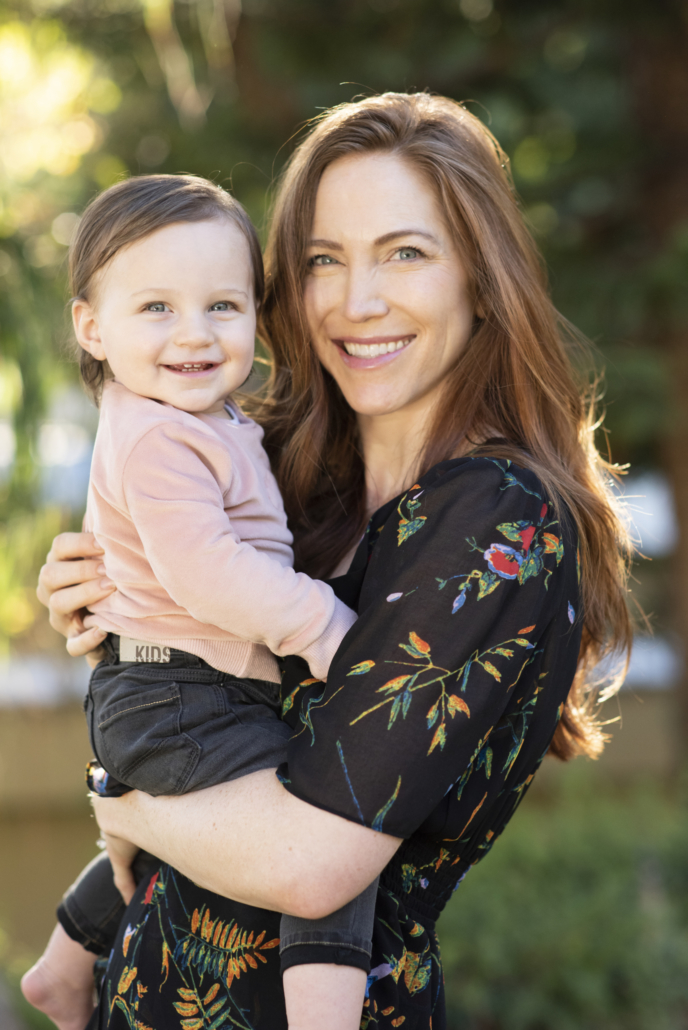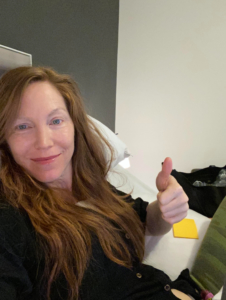Where/When
November 2020. I’m forty-one and my daughter is thirteen months. When breastfeeding, I feel my breasts to see which has more milk. Grab my boobs like udders. Check my supplies. On the underside of my left breast, about six o’clock as the doctors and technicians would eventually refer to the location, I find a lump.
I’d heard about the infamous lump women are supposed to check for in showers and self-exams. I used to wonder how to know that one lump is different from all the others. I had lumpy dense breasts. What’s one more lump? Yet this lump was hard and foreign. Like a wadded piece of Bazooka gum.
Strong and healthy, I ate all the right things. Worked out. Walked. I had deep connections. A loving marriage. A bundle of joy. My cleaning products were so natural they barely cleaned a countertop. I blended celery juice in the mornings! I read Bruce Lipton! I was sure (SURE) that the lump would be a clogged milk duct.

Within three weeks I was driving home along Forest Lawn Drive when I got The Call. Breast cancer. Small, my gynecologist said. Probably will be a simple lumpectomy, he said. (What’s a lumpectomy?) Looking back I’m grateful it was dark and I hadn’t realized that I’d been driving past a cemetery, as I am a person that looks for meaning.
After I got married, I remember the first medical history form I filled out. I checked the box Married instead of Single. A momentous life shift, forty years one thing, and then not. Now three years later, there’s a new box: Cancer. I used to breeze by the section that lists present and past history of diseases. With bravado (and yes, pride!) I’d take my pen and make a line through all of the No’s. Asthma? No. Cancer? No. Ulcers? No.
Some events you have to experience to truly understand. I would assume winning an Olympic medal is one. Childbirth. Marriage. Climbing Mt. Kilimanjaro. You can understand similar feelings to these big experiences but until you’ve swam with sharks (I have), taken a company public (I haven’t), won Top Chef (I haven’t), worked on an oil rig in the middle of the ocean (I haven’t), lost a parent (I have), or gotten The Call (I have), you’re not in those clubs. I call them Where/Whens, because when you think of them, you know exactly where they happened and exactly when. Good or bad, Where/Whens fundamentally change you. Getting a cancer diagnosis is like driving down a road and in an instant getting shoved onto a different road. The landscape is different. The asphalt goes from tar to rough dirt. You lose cell service.
A few days later, I breastfed my baby in a breast cancer surgeon’s office while he told me about my diagnosis. The breast center at Cedars Sinai had been redone to look like the inside of a futuristic spa. Each room was a pod fit for a spaceship with cool modular pocket doors and huge wall art that mimicked rock gradations in digital prints. The pink robes (did they have to be so on the nose?) were butter soft. The lighting wasn’t bad.
“There are four types, A, B, C, and D,” the doctor explained. Already telling me something I didn’t know. “You want A,” he said casually, like he was deciding what to have for brunch. “You have D.”
- The kind you least want. Or I think that was what he said, because I heard a sound like Waaa Waaaa Waaaaaa Waaa Waaa Waaa, as if I’d taken a hit of Nitrous Oxide.
Type D was Triple Negative breast cancer, the one medical professionals know the least about and the one that kills the most. In a nutshell.
We had our big meeting with our main Oncologist on Christmas Eve day. In a cold office she explained to us in detail what my options were (chemo and then more chemo). How deadly my cancer was (very). How quickly I needed to act (fast). Instead of breastfeeding my baby until an uncomfortable age, as I had planned, I now had to wean her in less than twelve days. Saying no to my daughter when she was opening and closing her little fist, the sign for milk, was the first trial I had to survive. I would have rather stepped into a pit of lava. It broke me, but maybe also strengthened me. As Glenon Doyle said, I could do hard things.
Triple negative is the most aggressive kind of breast cancer with the highest death rates. From the beginning I dealt with my diagnosis and the fear of death with denial. I didn’t face death. I didn’t think of how my family would do without me. I did not consider the real possibility that I could die. In Kelly Turner’s Book, Radical Remission, she researched the different behaviors of people that had radical remissions. There were predictable behaviors like supplements, diet and exercise. I was surprised that denial made the list, a proven means of survival. Denial is what I had spent a majority of my many years in therapy trying to dissolve. Denial was how I survived my childhood. Denial messed up a good deal of my life (Sorry twenties!). But here was my old enemy, showing up now as my friend.
The next couple months were filled with chemo and tests and fasting and supplements and high dose Vitamin C IVs. As someone who barely takes Tylenol or antibiotics, believing almost anything can be fixed at home with large amounts of garlic and oregano oil, chemo was scarier to me than cancer. I was scheduled to do five months of chemotherapy and then surgery, where they would discover whether the cancer had spread to any lymph nodes. I chose to have a partial mastectomy, saving my right breast to feed a future child.
The reality my denial couldn’t ignore was that I couldn’t go through cancer alone. I’m uncomfortable letting people help me. Don’t try to carry my bags. My codependency reads like a how-to-guide to being a martyr; no room for being the one that is taken care of. When I watch my now two-year-old daughter shout with delight about almost anything she manages on her own–“I can dood it alllll by myself!”–I wonder if codependency is like an ultra-contagious stomach flu, or whether celebrating her personal independence is healthy and normal. There are so many ways to be a bad parent, having cancer is one of them.
So many people helped me. When I first got sick, breast cancer survivors made themselves available, as I now make myself available. If you talk to twenty different women you’ll get twenty different stories. Breast cancer stories and the details of recovery are like snowflakes. Not knowing what to ask, I’d stumble through conversations and wait for an opening to ask the one question I needed to know. How much help would I need? I was terrified because I believed that my husband and daughter’s love for me was conditional on what I did for them. How could they love me if I got too sick? Panic set in. Looking back it seems selfish. I was more scared of abandonment (them leaving me) than death (me leaving them). My mind clamored to figure out how to go through the next few months leaving as small a footprint as possible. But that’s not how getting sick works. I didn’t need less, I needed more.

My husband, knowing how scared I was on the first morning of chemo, had somehow contacted my family and everyone I knew who was privy to my diagnosis (I kept my cancer pretty quiet) and told them to text me at the same time. At 9 a.m. on January 19th, I had thirty messages of love pour in from all over the country. Text after text, I wouldn’t have thought I needed. But as the texts started rolling in, the tears started rolling down: {buzz} I Love You, {buzz} You Can Do This!, {buzz} You’re an Amazon warrior!, {buzz} We Love You! {buzz} You’re strong!, {buzz} I love you! Each vibration was a puff of air blowing up a lifeboat. I realized getting healthy was not something I could do on my own.
I was very lucky. Or I did everything right. Or it’s some combination of both. I was what they call NED (No Evidence of Disease) after my first three months of chemo. My surgery went perfectly. When they biopsied the lymph nodes, no cancer had traveled outside the initial tumor.
People always want to know what LESSONS I learned from having cancer. Much like any one that has taken ayahuasca will tell you, each person needs something different. For me, changing my concept of independence to interdependence is what was required. I learned that even if I can do it all on my own, I shouldn’t. Life is better without the burden of being the burden.
There is a very funny episode of Larry David’s show, Curb Your Enthusiasm, where they give more weight to a friend’s advice that had stage four cancer. Stage one cancer patients weren’t really worth listening to. Thank God, I was stage one. (While there are different types of cancer there are also different stages and grades, there are an infinite number of ways to be diagnosed.) What the show was saying was people who were in stage four had looked death in the eye, they had come to terms with their maker, they had seen the world from an astronauts point of view and, by virtue of the depth of their dilemma, could bestow onto mere mortals the deeper values and truths of the universe. Is that true? Maybe. Thankfully, I never had to find out.
Gillian Shure is working on her MFA in Creative Writing at Antioch University. Her work has appeared in The Paragon Press, Carbon Culture Review, On The Bus, The MacGuffin, and Side-Eye on the Apocalypse. She lives in Los Angeles.





